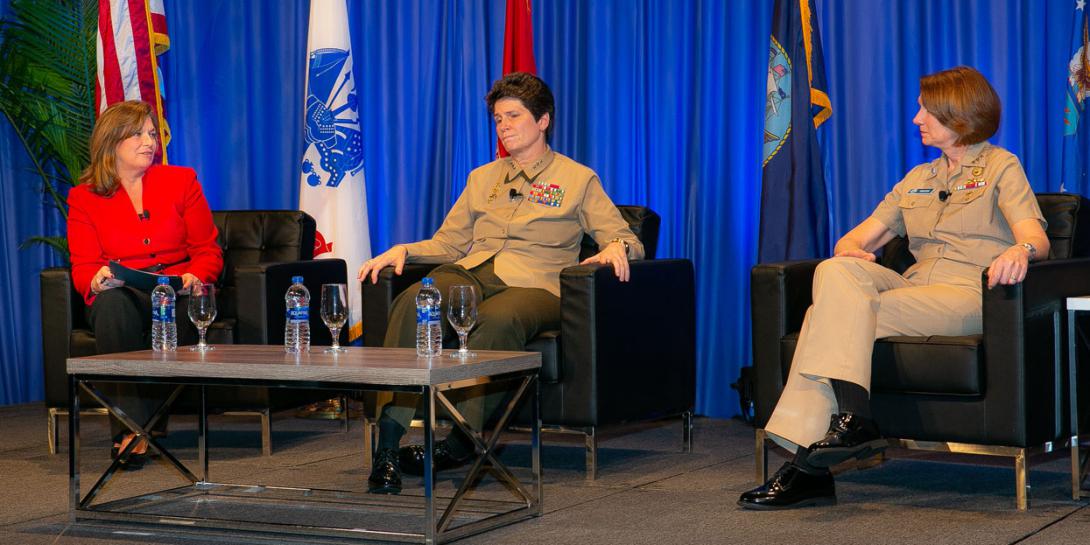The Power of Military Women in Technical Careers
Women face special challenges in the military and in technical careers. Those challenges are magnified for military women who are also in technical careers, but two successful military officers who have overcome those challenges have some words of support for those following in their footsteps.
Vice Adm. Nancy Norton, USN, director, Defense Information Systems Agency and the commander of the Joint Forces Headquarters–Department of Defense Information Network, and Lt. Gen. Lori Reynolds, USMC, deputy commandant for information, U.S. Marine Corps Headquarters, took time during the West Conference in San Diego to reflect on the challenges they’ve faced and to offer lessons learned and words of hard-earned wisdom for younger women in military technical fields—and for the men who hope to support them.
The fireside chat was part of AFCEA’s sixth annual Women’s Appreciation Award ceremony. Awards went to: Donatella Dominici, professor, Department of Civil, Construction-Architectural & Environmental Engineering, University of L’Aquila; Yolande Fong, DISA-PAC GS-14 (Retired), and a member of the AFCEA Hawaii Chapter; Col. Jenniffer Minks, USAF (Ret.), coalition interoperability division chief, deputy director of cyber and command, control, communications and computers integration, Joint Staff; Col. Kathy Swacina, USA (Ret.), senior federal program executive, Unitech Consulting, LLC.; and Master Sgt. Szu-Moy Toves, USAF (Ret.), a member of the AFCEA Alamo Chapter.
During the February 14 fireside chat moderated by DeEtte Gray, president of U.S. operations, CACI International and the chairwoman of the AFCEA board, both officers recalled entering the military at a time when options for women were not as abundant as they are now.
Adm. Norton joined the Navy during tremendous cultural shifts affecting women and the service. Those shifts included changes in the drug culture, the Mothers Against Drunk Driving movement and a 1991 scandal in which male Navy and Marine Corps officers and military contractors sexually harassed and assaulted women attending the Navy’s Tailhook Symposium in Las Vegas. “Coming out of that, we very quickly became a much better service, much stronger. Each one of those was a significant change in the norms and standards we had in the culture in the service,” she reported. “Every one of those changes made it easier for women in particular to fit in and feel comfortable in the roles that we had.”
But those roles were more limited at the time. The Navy allowed very few women to deploy at sea and only on noncombatant ships, and the Marine Corps none at all. “I wanted to go to sea and found out my class from Officer Candidate School didn’t have a billet available, so that option was taken off the table,” Adm. Norton said.
In addition, women in the Navy were allowed to fly aircraft, but women in the Marines were not. “As I look back on my career, the things that were available to women in the Navy and Marine Corps then, there wasn’t a lot,” Gen. Reynolds said. “That’s one of the reasons I ended up in communications.”
With those limited opportunities in mind, the general said she was unable to set her career goals very high. “All I really wanted at the time was to be a platoon commander or a company commander. That was as far as I could allow myself to set my goals. Beyond that, you just couldn’t see any way forward,” she asserted. “Even as a colonel in command, I thought that was it for me. I thought that was as far as I would be able to get in this organization.”
Gen. Reynolds says women sometimes have to set their sights a little differently. “You’re struggling to fit in knowing at the same time you have to stand out,” she said, adding that women also cannot let down their guard and become vulnerable to what she described as the culture of the day. “My hope for the gals coming in today is that they’re not facing that challenge because that is an everyday challenge. It changes who you are,” she said.
She learned a valuable lesson while playing basketball at the Naval Academy. “We did not have a bunch of intricate plays. We did the same basic drills over and over again,” she said. “Know your job. Nail the basics. Don’t cut corners. And then you can get a little bit more interesting in the way you approach the job.”
The general recalled another valuable lesson from a baseball coach: Don’t try to be the best player on the field. Be the best player at your position.
“That means outplay the other team and be there for your team. It’s about the team and finding a place on the team. Be present in the moment and take care of the Marines around you. It is true that when you take care of them, they take care of you. That’s absolutely true.”
For her part, Adm. Norton said women should make the most of every assignment. “I always tell the people I mentor don’t ever allow the job that you’re in to limit you because your job is what you make it. If you’re willing to make it a great job, then it will become a great job, and you will excel in it,” she advised.
In response to a question from the audience, both officers recommended that women speak up when faced with inappropriate actions or comments. “I think all of us have had those times we regret not calling people to task, but the one thing I will tell you is this: the majority of folks out there are just good folks. Don’t look for bias because it will find you,” Gen. Reynolds offered.
She added that women should pull the offending person aside and gently ask if they realize how offensive their comments or actions were. “You just have to call them on it and keep moving. There’s a gentle way to do that, but move on and always be the bigger person.”
Adm. Norton followed up the general’s comments by telling women that calling out offensive behavior is not a selfish act. “The way to find the courage to do that is to remember you’re not doing it for yourself—you’re doing it for everyone who could be subject to that after you,” she stated.
Gen. Reynolds also offered some advice for the military services. She pointed out that often married couples in the military are told that one career needs to take precedence over the other. “No, that’s the wrong answer. Both careers have to go forward,” she said.
Additionally, the services should better balance work and family life to retain women. Gen. Reynolds noted that the children of service members often do not want to attend three different high schools. “The most significant challenge we have right now is this work-life balance. Acknowledging that is counterculture for us,” the general declared. “The way we assign people would go a long way in messaging to people that their presence in our organization matters.”
Both women recalled having male bosses who mentored them and supported their careers. They both also had advice to offer for men who want to be supportive of women.
Gen. Reynolds noted that women often face different challenges than men, so men should not assume what works for them will work for their female colleagues. “Everybody’s path is different. Be open to listening to those different challenges and to enable some of those special circumstances women have to deal with, whether they have children or a family or a sick mother or whatever. It’s not a reflection of their desire to succeed. They just have different challenges,” she said.
Adm. Norton indicated that sometimes wanting to make a difference makes a difference. “The thing is to show up and care. Care about this issue,” the admiral said. “Whether that’s helping your wife or your sister or your daughters or nieces or other children around you, help them understand they don’t have limits beyond the ones they set for themselves.”
The April issue of SIGNAL Magazine will feature a special edition of The Cyber Edge with articles written exclusively by female subject matter experts.




Comment
As a United States Army
As a United States Army Soldier now retired. I can relate to a lot of this article says. I am still reliving some of it in my present job. Thank you for posting it. I have sent it to a few of my friends.
Comments